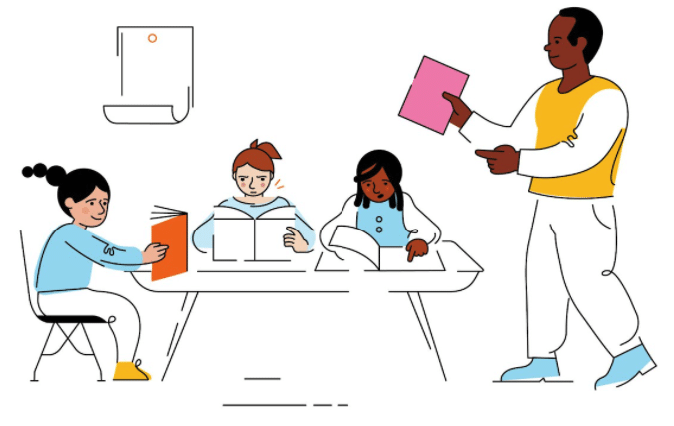
ItŌĆÖs that time of the year againŌĆöwhen the trees are blooming, summer is coming, and already teachers are peeking ahead to next fall!
ItŌĆÖs also a strategic time for educational leaders, who are already beginning to set professional development goals for teachers for the coming school year.
There are lots of excellent educational resources for teachers and leaders to access at this timeŌĆöincluding, of course, other teachers and leaders!
ThatŌĆÖs why we took this moment to ask Amplify Ambassadors: What advice would you offer to educators just starting their journey with Amplify?
HereŌĆÖs what they had to say, both about Amplify products and about teaching in general.
Teacher-to-teacher advice about Amplify products
ŌĆöDarcey Linton, Teacher, Student Support, Wissahickon School District, Pennsylvania
ŌĆ£Approach Amplify with the same wonder and enthusiasm as the children in your classroom! Take advantage of the fact that everything is new to all of you, and explore and adventure through each lesson together. One of our best resources is a working document we share that is filled with ŌĆśnotes for next year,ŌĆÖ something that we add ideas, links, and lab ideas to each year to make them easier to retrieve and implement the next time through.ŌĆØ
ŌĆöKim Eich, 6th-Grade Teacher, Anoka Hennepin ISD #11, Minnesota
Amplify ELA: ŌĆ£DonŌĆÖt skip the Quests! Especially in 7th grade, I love doing the Poe Quest and Perception Academy in [the] Brain Science [unit].ŌĆØ
ŌĆöChristine Wallace, Teacher/Reading Specialist, North Lakeland School District, Wisconsin
ŌĆ£Gather read-alouds about the CKLA knowledge domain topic. The recommended trade books listed on the Family Take Home page are a great way to start. IŌĆÖve borrowed them from our school library, and asked for donations. I display the books for ╣·▓·┬ķČ╣Šńto see. Students are able to grab them and read them throughout the day. Having themed, content-rich books readily available to ╣·▓·┬ķČ╣Šńallows them to build on their knowledge in a meaningful way.ŌĆØ
ŌĆöAlyssa Villalobos, 2nd-Grade Teacher, Riverside Unified School District, California
ŌĆ£I encouraged teachers to walk through both levels of the demo account offered in order to preview the ╣·▓·┬ķČ╣Šńexperience in Boost. This allowed them to see the progression of skills and expectations to know the base of what is being developed, and what they are working toward in the more advanced components.ŌĆØ
ŌĆöElizabeth Sillies, District Literacy Coach and Title I Supervisor, Three Rivers Local School District, Ohio
“Try it with fidelity first to see what works best for your teaching style and ╣·▓·┬ķČ╣Šńneeds. Once you have a grasp of the curriculum, then you can better supplement or modify it for you and your studentsŌĆÖ needs.”
Amplify CKLA: ŌĆ£When pre-teaching vocabulary words before the Read-Aloud, come up with a simple hand motion or facial expression for each word, [for example] hugging your body for the word ŌĆśembrace.ŌĆÖ Have the kids do the motions along with you and then listen for the words as you read. When they hear one of the vocabulary words, they should do the motion with you. The physical response helps cement language acquisition, especially for the majority of my ╣·▓·┬ķČ╣Šńwho are learning English, and listening for the words and motions keeps all ╣·▓·┬ķČ╣Šńengaged. Plus, it adds a micro-movement break.ŌĆØ
ŌĆöKathe McCormick-Evans, 1st-Grade Teacher, Arlington Public Schools, Virginia
ŌĆ£For Amplify CKLA, read the Intro section of each unit!! These are so full of professional development for the teachers. It will help you understand the why behind each theme and also explain some of the phonics rules you will be teaching to the students.ŌĆØ
ŌĆöAllie Appeal, Instructional Coach, School District of Arcadia, Wisconsin
ŌĆ£Don’t rush through the program to get it done. You won’t love it and your kids won’t love it. Take your time and enjoy the journey! The kids and you will appreciate [it] so much more!ŌĆØ
ŌĆöStephanie Schuettpelz, Teacher, Marion School District, Wisconsin
: ŌĆ£Try to progress monitor as often as possible. Weekly or every two weeks would be a great time frame based on the needs of the students.ŌĆØ
ŌĆöShennoy Barnett-Bell, Teacher, Johnston County Public Schools, North Carolina
Teacher-to-teacher advice about teaching (and more)
ŌĆöMelba Jordan, Teacher, Richmond County School System, Georgia
ŌĆ£Trust the process, especially in the upper grades when you cannot yet see the end result.ŌĆØ
ŌĆöMaria Fadden, PreKŌĆō8 Literacy Coach, Belle Plaine Public Schools, Minnesota
ŌĆ£Set a timer every time you allow ╣·▓·┬ķČ╣Šńto work independently or in groups. This allows them to start to use and understand time management. It makes everyone work with purpose and work quietly. I also play relaxing music as a white noise in the background.ŌĆØ
ŌĆöKerri Lintl, Teacher, Merrimac Community School, Wisconsin
“Make it fun! Your interest gets the ╣·▓·┬ķČ╣Šńmore involved than any fun activity you plan.”
Amplify CKLA: ŌĆ£Don’t be afraid to read word by word. You don’t have to memorize the script.ŌĆØ
ŌĆöDenise Sandoval, Literacy Coach, Catch Up & Read partnered with Dallas ISD, Texas
ŌĆ£Enthusiasm and positivity are contagious!ŌĆØ
ŌĆöStacey Smart, Reading Specialist, Romeo Community Schools, Michigan


